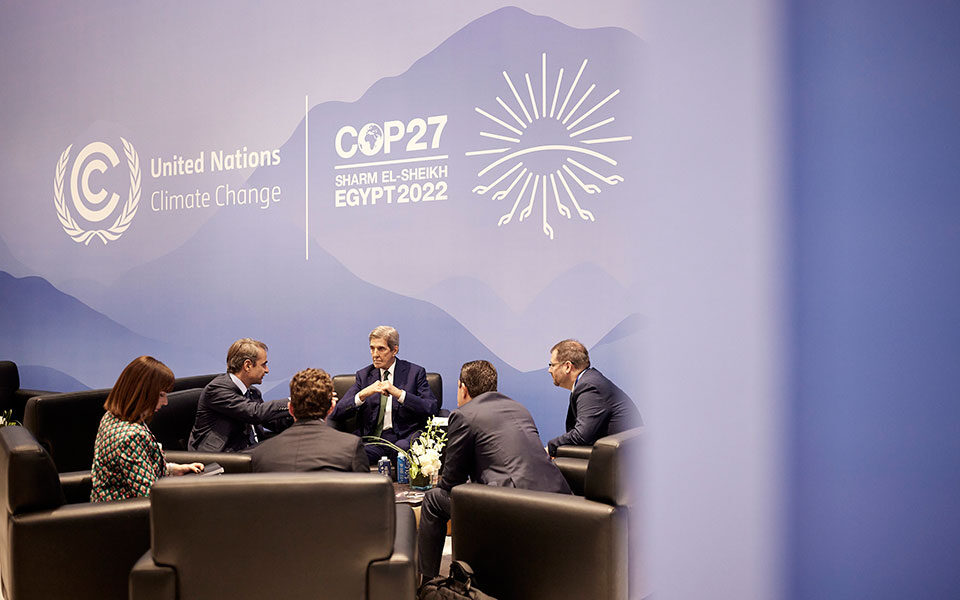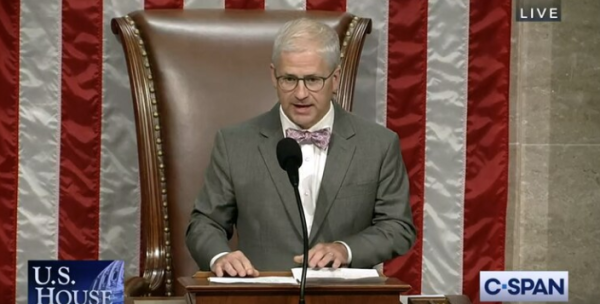
Greek Prime Minister Kyriakos Mitsotakis on Tuesday said his government aims to transform the east Mediterranean country into a net exporter of electricity to the rest of Europe, speaking at the 27th UN Climate Change Conference (COP27).
In reference to host country of Egypt, he repeated that Athens is discussing with Cairo the construction of an underwater cable in the east Mediterranean to link the two countries’ grids, something he said will transport cheaper solar energy from North Africa to Europe.
The conference is taking place at the well-known Sinai Peninsula resort of Sharm El-Sheikh.
He also said national governments must continue to support their citizens in the face of the ongoing energy crisis and cost-of-living hikes.
He full address reads:
“We meet today, in Sharm El-Sheikh, during an acute energy crisis—sparked by Russia’s unprovoked war on Ukraine.
And today, I want to speak to you as a “radical realist.”
Radical because I deeply believe in the energy transition. It is imperative. Ιt is unavoidable. The energy transition is not just about mitigating risk. It is an opportunity. It is also a strategic necessity.
Low-carbon energy means energy security—this much is clear. No one can shut down our wind or our sun energy.
But this energy transition will also allow us to reconceptualize Greece’s economic model.
For decades, we have been a net energy importer.
Our trade balance and our competitiveness have suffered.
This is changing.
Our future competitiveness will be grounded on abundant wind and solar resources.
Greece is already a leader in renewable energy.
Almost half of our electricity today comes from wind, solar, and water.
We have more than 10 gigawatts of installed solar and wind power and we rank in the top ten countries of the world in terms of the penetration of wind and solar.
Just a month ago, we reached a major milestone when, for five hours on a sunny and windy day in October, solar and wind met 100 percent of our electricity needs.
Meanwhile, our coal consumption has fallen by almost 80 percent in less than 10 years.
The energy we consume today emits 30 percent less CO2 than it did in 2005.
And we are just getting started.
We have just voted our first ever climate law, committing to carbon neutrality by 2050. We want to double our renewable capacity by the end of the decade.
We want to be a net electricity exporter to the rest of Europe.
We want to help carry energy and hydrogen from North Africa and the Middle East to Europe.
We are discussing with Egypt about building a 3 GW cable to bring cheap solar electricity from North Africa to Europe.
We intend to be at the center of a new corridor that will redraw the map of energy in Europe.
But at the same time, we must also manage today’s crisis.
Without energy security there is no energy transition.
Like many other countries, we need to briefly increase our lignite production.
At the same time, we need to import more LNG.
And we are investing in our gas infrastructure in order to enhance our energy security and that of our neighbors.
And at the same time, we need to keep supporting our citizens in order to tackle the adverse consequences of a profound cost of living crisis.
Personally, I see no tension between safeguarding the present and investing in the future. Our people will not support us otherwise.
That is why I believe that we need radicalism as well as realism.
I believe this is the only way forward and this is my message to you today.”
Latest News

Airbnb: Greece’s Short-Term Rentals Dip in March Amid Easter Shift
Data from analytics firm AirDNA shows that average occupancy for short-term rentals dropped to 45% in March, down from 49% the same month last year.

Easter Week in Greece: Holy Friday in Orthodoxy Today
At the Vespers service on Friday evening the image of Christ is removed from the Cross and wrapped in a white cloth

Meloni and Trump Meet in Washington, Vow to Strengthen Western Ties
“I am 100% sure there will be no problems reaching a deal on tariffs with the EU—none whatsoever,” Trump stressed.

ECB Cuts Interest Rates by 25 Basis Points in Expected Move
The ECB’s Governing Council opted to lower the deposit facility rate—the benchmark for signaling monetary policy direction—citing an updated assessment of inflation prospects, the dynamics of underlying inflation, and the strength of monetary policy transmission.

Current Account Deficit Fell by €573.2ml Feb. 2025: BoG
The improvement of Greece’s current account was mainly attributed to a more robust balance of goods and, to a lesser extent, an improved primary income account

Hellenic Food Authority Issues Food Safety Tips for Easter
Food safety tips on how to make sure your lamb has been properly inspected and your eggs stay fresh.

Greek Kiwifruit Exports Smash 200,000-Ton Mark, Setting New Record
According to data by the Association of Greek Fruit, Vegetable and Juice Exporters, Incofruit Hellas, between September 1, 2024, and April 17, 2025, kiwifruit exports increased by 14.2%.

Easter Tourism Boom: Greece Sees 18.3% Surge in Hotel Bookings
Among foreign markets, Israel has emerged as the biggest growth driver, with hotel bookings more than doubling—up 178.5% year-on-year.

Greece to Launch Fast-Track Tender for Offshore Hydrocarbon Exploration
Last week, Papastavrou signed the acceptance of interest for the two Cretan blocks, while similar decisions regarding the two Ionian Sea blocks were signed by his predecessor

American-Hellenic Chamber of Commerce to Open Washington D.C. Branch
AmCham's new office aims aims to deepen U.S.-Greece economic ties and promote investment and innovation between the two countries







![Πλημμύρες: Σημειώθηκαν σε επίπεδα ρεκόρ στην Ευρώπη το 2024 [γράφημα]](https://www.ot.gr/wp-content/uploads/2025/04/FLOOD_HUNGRY-90x90.jpg)




![Airbnb: Πτωτικά κινήθηκε η ζήτηση τον Μάρτιο – Τι δείχνουν τα στοιχεία [γράφημα]](https://www.ot.gr/wp-content/uploads/2024/07/airbnb-gba8e58468_1280-1-90x90.jpg)

























![Airbnb: Πτωτικά κινήθηκε η ζήτηση τον Μάρτιο – Τι δείχνουν τα στοιχεία [γράφημα]](https://www.ot.gr/wp-content/uploads/2024/07/airbnb-gba8e58468_1280-1-600x500.jpg)


 Αριθμός Πιστοποίησης
Αριθμός Πιστοποίησης